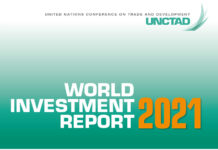Global foreign direct investment (FDI) remained flat in 2019, at $1.39 trillion, a 1% decline from a revised $1.41 trillion in 2018. This is against the backdrop of weaker macroeconomic performance and policy uncertainty for investors, including trade tensions.
FDI flows to developed countries remained at a historically low level, decreasing by a further 6% to an estimated $643 billion. Flows to developing economies were unchanged at $695 billion. Flows to transition economies rose by two thirds to $57 billion.
Trends in selected economies:
– FDI in the United Kingdom down 6% as Brexit unfolds.
– Hong Kong, China divestments cause a 48% FDI decline in turbulent times.
– Singapore up 42% in a buoyant ASEAN region.
– Zero-growth of flows to both the United States and China.
– Brazil up 26% at the start of a privatization programme.
– German inflows triple as MNEs extend loans to foreign affiliates in a year of slow growth.
Looking ahead, UNCTAD expects FDI flows to rise marginally in 2020 on the back of further modest growth of the world economy.
Image: GBSE





